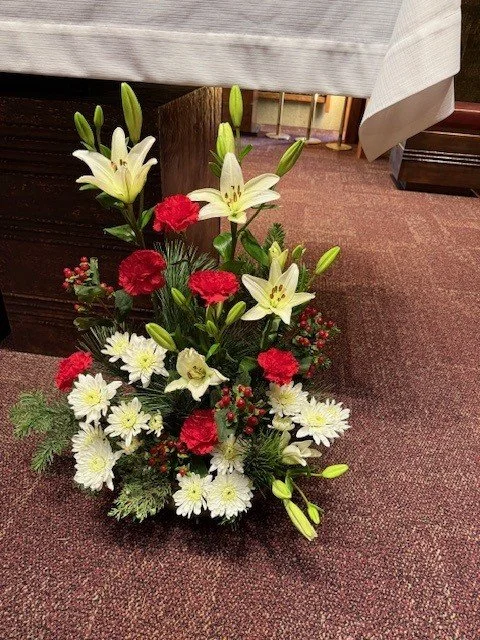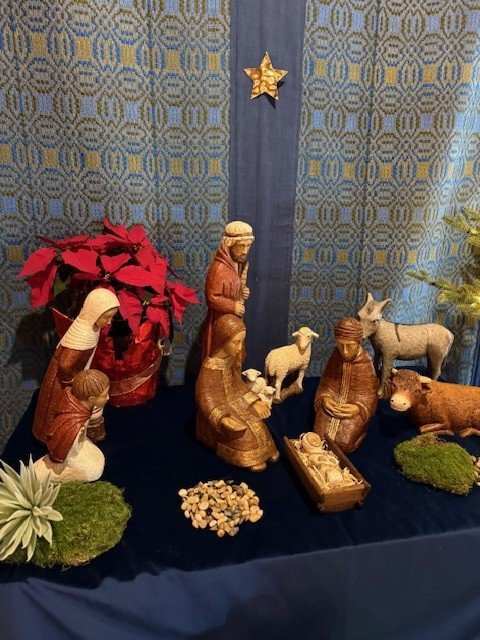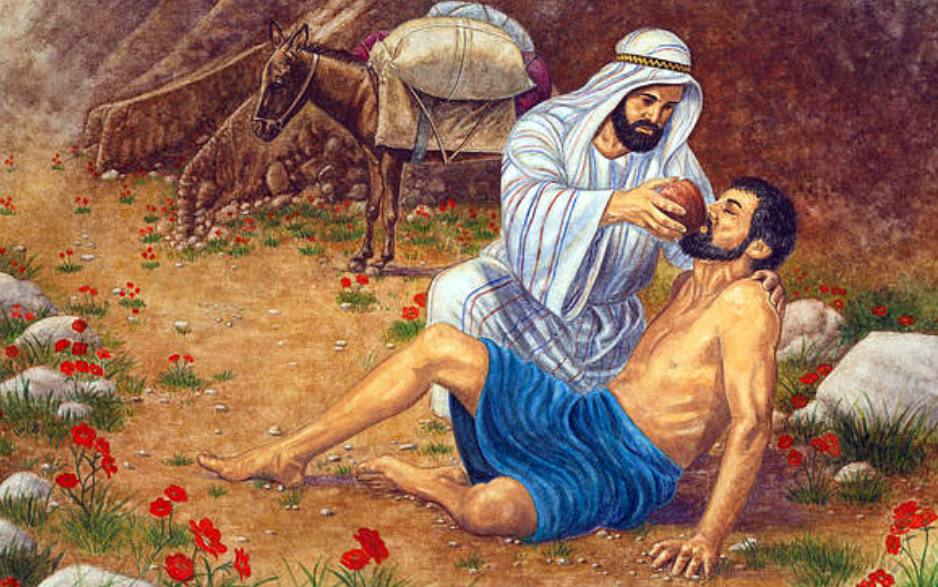Fr. Paul Kasun, OSB
St. Benedict Center, Schuyler, Nebraska
Presentation of Jesus in the Temple, Year C
Malachi 3:1-4; Hebrews 2:14-18; Luke 2:22-40
Once again, the monks and I welcome you to St. Benedict Center and hope that may you have a blessed and Happy Feast Day of the Presentation. As I was preparing my sermon, I realized that our readings are rich in themes and ideas, of which any one of them could provide us with inspiration and joy in our Faith. In this sermon, I have decided to talk about Mary, Joseph and Simeon as Faith actors, as people of deep Faith. What did their Faith lead them to do? What does our Faith lead us to do? Let me begin with a personal story that transformed my concept of God, which also changed how I related to God. Many years ago, probably before I got to High School, my mom and I got into a conversation about God. She and my dad had a deep Faith, and they grasped it well. I do not remember how our conversation got started, but as she was ironing clothes in the kitchen, she said to me, as I stood next to her, that God knows everything that we think and do. “God knows all of your thoughts.” This phrase was a shocking revelation for me. I probably looked surprised, and I left the kitchen. This “new” concept changed what I knew about God, and it changed my relationship with God as well. I needed time to reflect and to integrate this new “reality” about what it meant for my life. Indeed, the Holy Spirit was guiding me on a “Faith Journey” and my relationship with God and the Church deepened.
One of the cornerstones of Faith, is that God, through our priests, forgives our sins. The same went for the Jewish people in the times of the Holy Family. Mary, a faithful Jewish woman, kept all the ritual practices of being Jewish, and went with Joseph to present their newborn baby in the Temple. St. Luke wrote, “When the days were completed for their purification according to the law of Moses, Mary and Joseph took Jesus up to Jerusalem to present him to the Lord…” The ritual of the Presentation had themes of sin and redemption: “(1) the purification of Mary and (2) the redemption of baby Jesus.”[1] However, our Faith is clear: Mary never sinned, and Jesus is our redeemer. What this means for us, is that “Mary’s uncleanness was not moral buy only ceremonial (JBC 44:42).” And, Jesus’ Presentation was not about being redeemed, because he was already “possessed by his Heavenly Father even before this ceremony; this act formalized or externalized what was and would remain always true (JBC44:42).” But something else is going on here: it is a journey of Faith. Mary, Joseph and Simeon each had their own “Faith Journeys”, and now, here at the Presentation of Jesus in the Temple, their journeys intersected. For Mary and Joseph, the Jewish religion was a divine institution, and so this meant that they would go to the Temple to present Jesus to the Rabbi. This, and other rituals were integral to their expression of Faith, for it is how God communicated with them and the Jewish community.
Simeon’s journey of Faith pretty much ended when Mary and Joseph gave him the baby Jesus to hold in his arms and present him to God. For Simeon, this experience comforted him for all the suffering that he endured as he watched the Jewish people pull away from their Faith. St. Luke wrote that Simeon “was righteous and devout, awaiting the consolation of Israel, and the Holy Spirit was upon him.” Luke did not write directly about the sufferings of Simeon, but his phrasing and choice of words gives us all what we need to understand the circumstances under which Simeon (and even Anna), practiced their Faith. St. Luke quotes Simeon: “‘Now, Master, you may let your servant go in peace, according to your word, for my eyes have seen your salvation, which you prepared in the sight of all the peoples: a light for revelation to the Gentiles, and glory for your people Israel’.” After this prayer of Presentation, he gave Jesus back to Mary, and he told her that her Faith journey would entail many sufferings, but they will be sufferings that bring salvation for humanity. As one commentator wrote, “Simeon most probably a member or close associate of the Sadducee group, must have waited amidst great suffering, as he witnessed the priestly betrayal of many sacred obligations (JBC:44:42).” The actual Presentation of Jesus in the Temple was, indeed, one experience among many, in the Faith journeys of Mary, Joseph, Simeon, and Anna. Their love for God and the Jewish religion intersect, coming together here at the Temple.
The Faith journeys of these great characters led to the writing of the letter to the Hebrews. Indeed, well after Jesus’ ascension into heaven, Christian communities grappled with the problem of integrating their Faith into their daily lives. The writer of Hebrews said: Jesus “had to become like his brothers and sisters in every way, that he might be a merciful and faithful high priest before God to expiate the sins of the people. Because he himself was tested through what he suffered, he is able to help those who are being tested.” The Churches after the death of the Apostles struggled to integrate and pass on their Faith to their children. Christianity was a new way of thinking and acting. However, Christians lived in a world of contradictions – where they hoped to change the morality within their own communities. Jesus represented a new way of living – a new human civilization. Jesus knew that their Faith journeys would be very, very difficult. As one commentator wrote, Jesus “experienced [temptations] throughout his life.” “Gospel tradition indicates that fidelity to his messianic mission was a principal object of temptation… The temptation of those… addressed [in the letter to the Hebrews] was principally to apostasy – fundamentally the same urge to infidelity that Jesus experienced (JBC, 61:18).”
Indeed, the Faith journeys of the men and women in our Bible are like our own Faith journeys. Last Wednesday, Pope Francis spoke about the faith journey of St. Joseph, and I would like to end my homily with a quote by Pope Francis on the Faith journey of Joseph:
In a dream, Joseph accepts God’s dream for his life. Joseph “believes, hopes and loves. He does not express himself with “idle words”, but with concrete deeds. He belongs to the lineage of those who, according to the apostle James, “put the Word into practice” (cf. James 1:22), translating it into deeds, flesh, life. Joseph trusts in God and obeys:” He takes “on a fatherhood capable of guarding, protecting and passing on a material and spiritual inheritance. The womb of his bride is pregnant with God's promise, a promise that bears a name in which the certainty of salvation is given to all (cf. Acts 4:12)…[
Reading 1 MAL 3:1-4
Thus says the Lord GOD:
Lo, I am sending my messenger
to prepare the way before me;
And suddenly there will come to the temple
the LORD whom you seek,
And the messenger of the covenant whom you desire.
Yes, he is coming, says the LORD of hosts.
But who will endure the day of his coming?
And who can stand when he appears?
For he is like the refiner’s fire,
or like the fuller’s lye.
He will sit refining and purifying silver,
and he will purify the sons of Levi,
Refining them like gold or like silver
that they may offer due sacrifice to the LORD.
Then the sacrifice of Judah and Jerusalem
will please the LORD,
as in the days of old, as in years gone by.
Reading 2 HEB 2:14-18
Since the children share in blood and flesh,
Jesus likewise shared in them,
that through death he might destroy the one
who has the power of death, that is, the Devil,
and free those who through fear of death
had been subject to slavery all their life.
Surely he did not help angels
but rather the descendants of Abraham;
therefore, he had to become like his brothers and sisters
in every way,
that he might be a merciful and faithful high priest before God
to expiate the sins of the people.
Because he himself was tested through what he suffered,
he is able to help those who are being tested.
Gospel LK 2:22-40 OR 2:22-32
When the days were completed for their purification
according to the law of Moses,
Mary and Joseph took Jesus up to Jerusalem
to present him to the Lord,
just as it is written in the law of the Lord,
Every male that opens the womb shall be consecrated to the Lord,
and to offer the sacrifice of
a pair of turtledoves or two young pigeons,
in accordance with the dictate in the law of the Lord.
Now there was a man in Jerusalem whose name was Simeon.
This man was righteous and devout,
awaiting the consolation of Israel,
and the Holy Spirit was upon him.
It had been revealed to him by the Holy Spirit
that he should not see death
before he had seen the Christ of the Lord.
He came in the Spirit into the temple;
and when the parents brought in the child Jesus
to perform the custom of the law in regard to him,
he took him into his arms and blessed God, saying:
“Now, Master, you may let your servant go
in peace, according to your word,
for my eyes have seen your salvation,
which you prepared in the sight of all the peoples:
a light for revelation to the Gentiles,
and glory for your people Israel.”
The child’s father and mother were amazed at what was said about him;
and Simeon blessed them and said to Mary his mother,
“Behold, this child is destined
for the fall and rise of many in Israel,
and to be a sign that will be contradicted
--and you yourself a sword will pierce--
so that the thoughts of many hearts may be revealed.”
There was also a prophetess, Anna,
the daughter of Phanuel, of the tribe of Asher.
She was advanced in years,
having lived seven years with her husband after her marriage,
and then as a widow until she was eighty-four.
She never left the temple,
but worshiped night and day with fasting and prayer.
And coming forward at that very time,
she gave thanks to God and spoke about the child
to all who were awaiting the redemption of Jerusalem.
When they had fulfilled all the prescriptions
of the law of the Lord,
they returned to Galilee, to their own town of Nazareth.
The child grew and became strong, filled with wisdom;
and the favor of God was upon him.
[1] https://stpaulcenter.com/the-deeper-meaning-of-the-presentation-in-the-temple/
[2] POPE FRANCIS; GENERAL AUDIENCE; Audience Hall; Wednesday, 29 January 2025
















